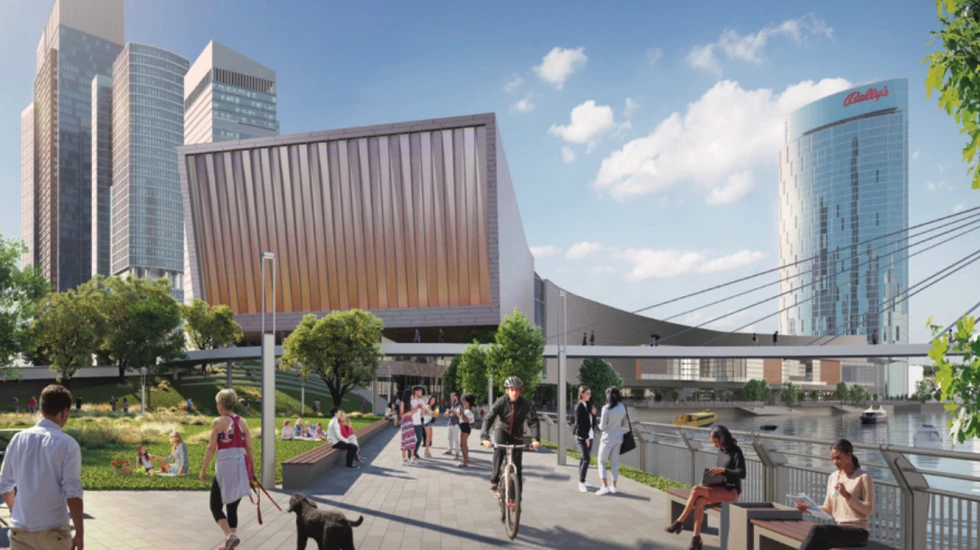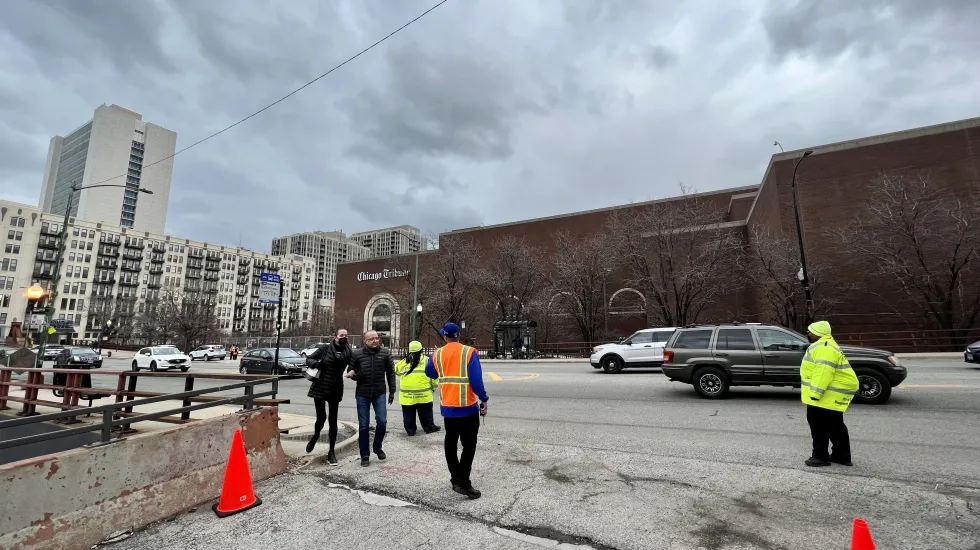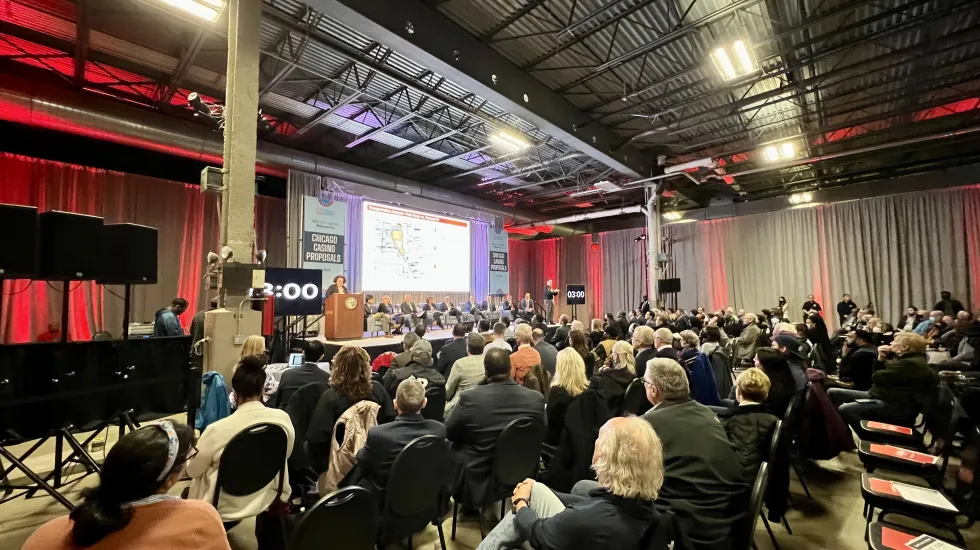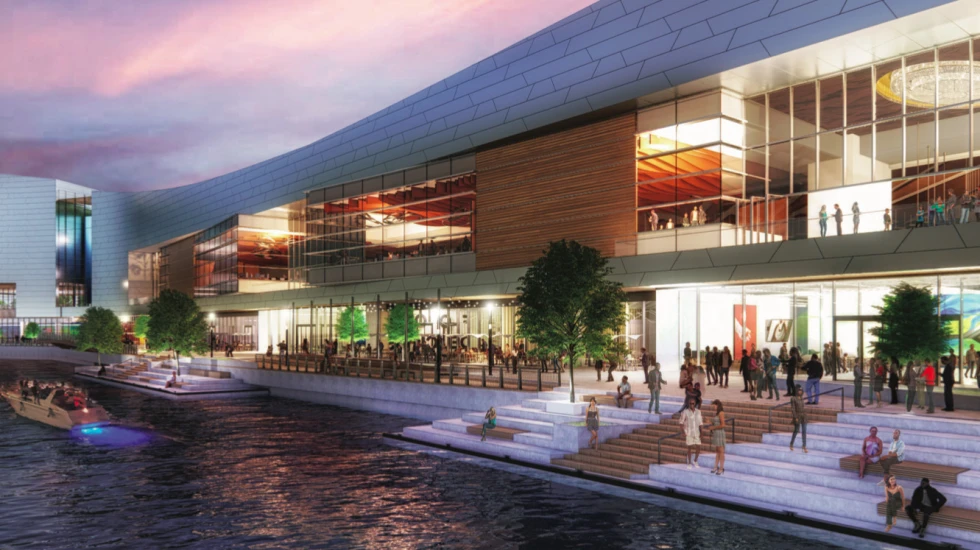
Executives from an East Coast gambling company on Wednesday tried to gas up support for their proposed River West casino by insisting it would ease traffic in the congested neighborhood — but they were met by a room of many possible future neighbors urging them to pump the brakes.
Rhode Island-based Bally’s Corporation pitched its plan for a sprawling gambling complex on a 30-acre plot near Halsted Street and Chicago Avenue, which is currently home to the Chicago Tribune’s printing plant — and the source of traffic headaches on a daily basis.
The city even issued a traffic alert hours in anticipation of the 300-capacity crowd of neighborhood residents who gathered Wednesday in a warehouse at the proposed casino site for a public hearing on the project. It was the second of three public presentations scheduled for this week as Mayor Lori Lightfoot mulls three finalists for the coveted casino license.

Most of the residents’ comments on Bally’s plan were parked on one issue: traffic.
“I love my neighborhood,” one River North resident wrote on a public comment card, the city’s chosen format for most community input at the meeting. “It’s slowly disappearing, and a casino would take away what remains and increase already congested traffic.”
“The Bally’s Casino complex is simply the wrong project for this location,” said Brian Israel, president of the River North Residents Association. “The additional strain on infrastructure, noise lighting, traffic and impact on property values are unreasonable burdens.”

Similar criticisms have been lodged against Bally’s competitors for the casino license: a Hard Rock casino proposed across the street from Soldier Field, and a Rivers casino eyed for the South Loop green field known as the 78.
Bally’s chairman Soo Kim tried to flip that script at the outset of the presentation, highlighting studies suggesting their $1.7 billion casino plan — which also calls for a 3,000-seat theater, an outdoor music venue and a Chicago Riverwalk extension — would actually cut down on traffic.
That’s because their budget includes millions toward 30 infrastructure improvements in the area, including a resurfacing of Halsted and a series of new traffic and pedestrian signals.
“Our project is complementary to the problems that you have,” Kim said.

City officials lent some support to that claim in a report evaluating the casino applicants last month, writing that Bally’s plan “should result in less traffic in the weekday morning, similar traffic levels in the weekday evenings, and additional traffic during weekend evenings.”
The city’s report on Bally’s didn’t have much negative to say about their plan — but Jennie Huang Bennett, the city’s chief financial officer, suggested the city wasn’t on board with a controversial provision of the corporation’s minority investment program. It initially held that the corporation would have the option to buy out minority shareholders after six years.
Bennett said last month that the city “values having longevity of minority ownership” — and Bally’s promptly backed off that fine-print provision.
On Wednesday, Kim dismissed the criticism as “noise,” saying “we’ve continued to evolve [on] this.” Women and minorities will account for “at least” 25% of the ownership group, he added.

Bally’s has also offered up a $25 million upfront payment directly to the city if they land the casino — a quick cash infusion that the other bidders haven’t yet offered up.
That’s a definite plus for city officials eager to get a big-city gambling emporium and running as quickly as possible to start churning out tax revenue, which is earmarked for Chicago’s desperately underfunded police and firefighter pension funds.
The city already projects Bally’s River West proposal as the most lucrative of the finalists, churning out estimated annual tax revenues of almost $192 million, according to the city report.
But that’s dependent on Bally’s finishing both phases of its construction plan, which calls for 100 hotel rooms initially, then expanding to 500 total. Only then would it hit max revenue projections, by the city’s estimation.
The mayor has put together a City Council committee to narrow the field down to one finalist within the next few months. That bidder would then have to apply for state approval.
The Rivers 78 site will be discussed from 6 p.m. to 8 p.m. Thursday at the University of Illinois Chicago’s Dorin Forum, 725 W. Roosevelt Road. It’ll also be streamed online at chicago.gov/live.







